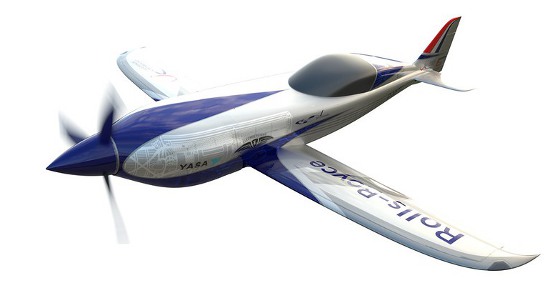 |
| October 20, 2020 | Volume 16 Issue 40 |
Designfax weekly eMagazine
Archives
Partners
Manufacturing Center
Product Spotlight
Modern Applications News
Metalworking Ideas For
Today's Job Shops
Tooling and Production
Strategies for large
metalworking plants
Rolls-Royce completes ground testing for world's fastest all-electric plane tech

The Rolls-Royce ACCEL project plane aims to be the fastest electric plane in the world. [All images courtesy: Rolls-Royce]
Rolls-Royce is one step closer to getting its experimental ACCEL project airplane together and in the air to compete for the title of world's fastest all-electric aircraft. The company has completed ground testing of the technology that will power the sport-class racing craft to over 300 mph.
Rolls-Royce says all the technology has been tested on a full-scale replica of the plane's core, including a 500-hp electric powertrain and a battery with enough energy to supply 250 homes or fly 200 miles (London to Paris) on a single charge.
There is a long history of using iron-birds in aviation for testing propulsion systems ahead of flight, but in this case Rolls-Royce has named the test airframe "ionBird" after the zero-emission energy source propelling the aircraft.

The ionBird test stand is made up of a full-scale replica of the plane's core.
The plane is part of a Rolls-Royce initiative called ACCEL, which is short for "Accelerating the Electrification of Flight." The project team includes key partners YASA, the electric motor and controller manufacturer, and aviation startup Electroflight. Half of the project's funding is provided by the Aerospace Technology Institute (ATI), in partnership with the UK Department for Business, Energy & Industrial Strategy, and Innovate UK.
The systems will soon be integrated into the plane, which has been named the "Spirit of Innovation."
The target speed for the sport-class racing aircraft is 300+ mph, which should beat the current record, held by inventor and all-around thrill-seeker Chip Yates, handily. Yates built his own electric plane, called the Long-ESA, and set a Guinness World Record in his single-seater on Oct. 6, 2013, with an average speed of 216.9 mph during two runs on a 1-km course at the California Capital Airshow in Sacramento, CA.

The Rolls-Royce team has continued developing the technology this year while adhering to the UK government's social-distancing and other health guidelines.
According to the developers, "ACCEL will have the most power-dense battery pack ever assembled for an aircraft, providing enough energy to fuel 250 homes or fly 200 miles (London to Paris) on a single charge. Its 6,000 cells are packaged to minimize weight and maximize thermal protection. An advanced cooling system ensures optimum performance by directly cooling cells during the high-power record runs."

ACCEL will use three 750R lightweight e-motors manufactured by YASA. Working together, these power-dense motors will deliver more than 500 hp -- with 90% energy efficiency -- to the propeller at a lower rpm than a conventional airplane, which should translate to increased stability and less noise.
The powertrain will run at 750 V, similar to a Formula E car, enabling high-power output at relatively low weight. The propeller will have three electrically actuated blades that spin at 2,400 rpm. The all-electric racer will also sport a state-of-the-art controls system.
At max power, the ACCEL plane should deliver 750 kW and 1,000 hp. Rolls-Royce says this is roughly the equivalent of a gasoline-powered Formula 1 car -- but without the emissions.
For the latest ionBird trials, the engineering team has tested each and every component of the system, including:
- Running the propeller up to full speed (approximately 2,400 rpm) using the most power-dense battery pack ever assembled for aircraft propulsion.
- Optimizing the system and developing operating procedures for electric flight.
- Generating gigabytes of data every hour of operation, which the team has analyzed to improve performance wherever possible.
The first flight for the ACCEL Spirit of Innovation electric plane is still planned for later this year. If that goes well, the all-electric flight world record will be attempted in early 2021.
The ACCEL project is just one way that Rolls-Royce is developing lower-carbon power. The company has also partnered with Airbus on the E-Fan X technology demonstrator project, which is an important stepping stone toward hybrid electric commercial aircraft at the scale of today's single-aisle planes. In the project's test aircraft, one of the four jet engines will be replaced by a 2-MW (2,700-hp) electric motor. That project should see air time in 2021.
Source: Rolls-Royce
Published October 2020
Rate this article
View our terms of use and privacy policy
